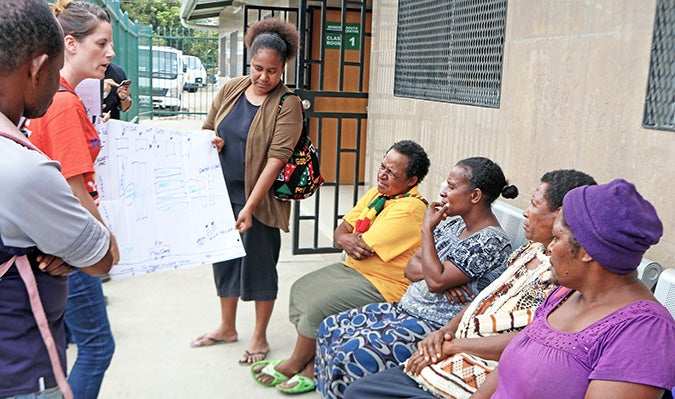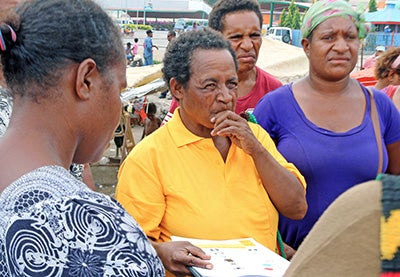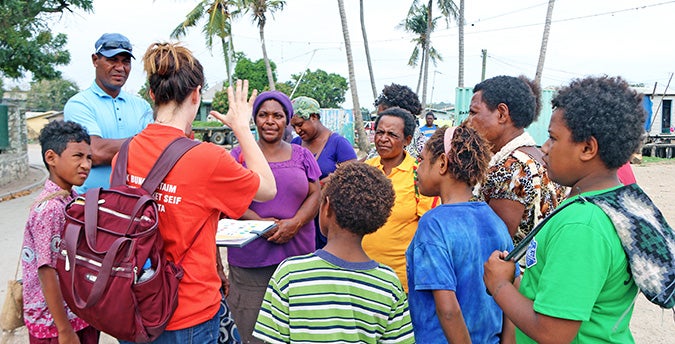Authorities making Port Moresby’s bus stops and markets safer for women
Date:
Port Moresby, Papua New Guinea – Municipal, transport and police authorities in Port Moresby have committed to take immediate steps to ensure safety for women and girls around bus stops and public markets.

UN Women met with the municipality’s Safe Cities Steering Committee on 18 October to present the recommendations of women who use the markets and bus stops daily. After doing a safety audit, the women recommended improved shelter, lighting, sitting areas, and management of crowds.
UN Women, in collaboration with the NGO Women in Cities International, tailored the Women’s Safety Audit specifically for markets and bus stops. The audit, originally created in Canada in 1989 by the Metropolitan Toronto Action Committee on Violence against Women and Children, is a community monitoring tool used worldwide. It consists of a checklist of 15 questions used to assess seven principles of women’s safety in public spaces including lighting, visibility, walkability, availability of clean spaces, and access to help. Women who use the public spaces daily are engaged as experts to identify what makes them safe or unsafe and to provide recommendations.

The Port Moresby audit was carried out in three stages. First, the UN Women Safe City technical team collaborated with Women in Cities International to tailor the audit to the local context. More than 800 languages are spoken in the city but many women commuters and vendors are illiterate. The questions on the checklist were expressed as icons so that everyone could participate in the audit. Various icons represented such elements as lighting and access to help. A color-coded system similar to the city’s traffic light system was used to assess degrees of satisfaction on safety. The tool was then tested and improved with the help of local NGOs and research institutes.
Secondly, the UN Women Safe City team trained 30 women vendors and a group of people with disabilities on the purpose, methodology and use of the audit. They learned the seven principles of safety, the safety icons and the color-coded system.
Finally, after the training, the vendors did the audit at Gordon’s and Koki markets and nearby bus stops, and provided their recommendations for improvements. Groups of 7-10 women completed the checklist based on what they observed. Among the aspects the women identified as making them feel unsafe were unorganized crowds around the bus stops; lack of lighting; constant sexual harassment; and the cars around the market, which hindered visibility and access to help. The participants with disabilities noted the lack of ramps in the market and signs for blind people.
The audit groups recommended that the authorities consult people with disabilities when facilities are designed; upgrade the bus stops including the lighting and the shelter and sitting areas; fix trash cans; designate a specific stop for taxis; and better manage the crowds around the bus stops.

“These recommendations represent an immediate call for action,” said UN Women Country Representative Jeffrey Buchanan. “Women are courageously voicing their safety needs and recommendations. Now it is the turn for the responsible authorities to provide short-term tangible solutions to make public spaces safer for women and girls.”
The Deputy City Manager -- Planning & Regulatory for the National Capital District Commission, Kenneth Atasoa, acknowledged the partnership with UN Women and Road Traffic Authority, and the need to establish a committee to coordinate the implementation of the recommended steps at the bus stops. Representatives from the police also proposed foot patrols in these areas to protect women.
The gender audit is part of the Safe Transport Project and is funded by the Australian Government.
For more information
Please contact: Lizzette Soria
Programme Specialist, UN Women Papua New Guinea
Email: [ Click to reveal ]